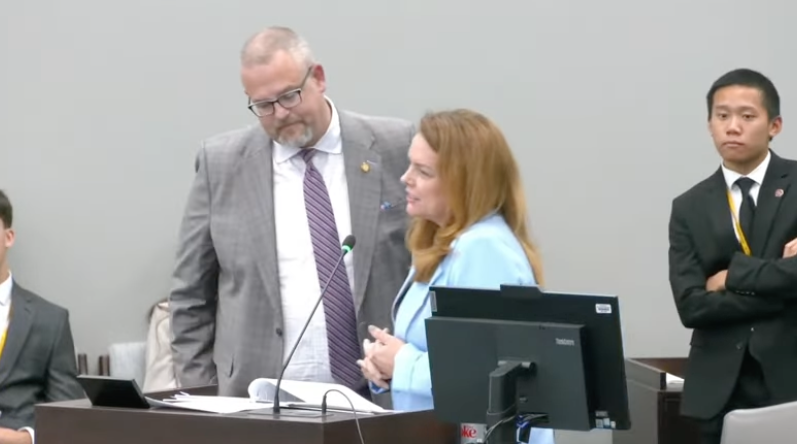Two distinct Senate bills SB 636 and SB 574, if passed, could nullify a recent policy change to let high school students enter into “name, image, likeness,” or NIL, contracts before the new policy goes into effect July 1st.
Early this month, high school students became able to sign NIL contracts to profit from while in high school thanks to a new policy passed by the North Carolina High School Athletic Association’s (NCHSAA) board of directors.
Senate Bill 636: School Athletic Transparency
SB 636, short titled School Athletic Transparency, passed the Senate across party lines with a 30-20 vote supported by Senate Republicans. If passed, the bill would grant the State Board of Education additional authority to supersede high school athletic policies involving public schools.
It states that “The State Board of Education shall adopt rules governing high school interscholastic athletic activities conducted by public school units,” including “Student amateur status requirements” and “rules related to use of a student’s name, image and likeness”
The reasoning for this reclamation of authority for the State Board of Education, according to Primary sponsor Senator Vickie Sawyer, R-Iredell, was that under her view, the NCHSAA has been running unchecked for roughly 20 years.

In an interview with On3, Sen. Sawyer cited the NCHSAA’s large endowment and budget, the $500 fines that they issued to parents that live streamed games, the recent admittance of private schools into the NCHSAA, and the nearly $24 million in securities reported on the organization’s Form 990 for the 2020-21 tax year as all reasons to doubt the NCHSAA competency and legitimacy.
“So, why is it that they feel entitled to negotiate on our children’s behalf just because they are the ones who make sure the trains run on time when we have a playoff game?” Sawyer told the sports news outlet.
Senate Bill 574: Authorize NIL Agency Contracts
On the other hand, SB 574, short titled Authorize NIL Agency Contracts, passed the Senate unanimously late last month. The bill authorizes and regulates the way agents need to conduct themselves around student clients as well as outlines how contracts need to be written.
For example, large boldface type in capital letter warnings needs to be put somewhere near the signature line, telling the athlete that they will lose their eligibility to compete as a student-athlete once he/she signs this contract. Alongside this is also the notice to consult with your institution of higher learning about your contract as well as telling the athlete and their agent that they have 72 hours for both of them to consult the athletic director.
Prohibited conduct on the part of the agent includes such actions as:
- “Furnishing anything of value to a student-athlete before the student-athlete enters into the agency contract”
- “Furnishing anything of value to any individual other than the student-athlete or another registered athlete agent”
- Initiating “contact with a student-athlete unless the athlete agent is registered.”
The goal of SB 574 according to one of the primary sponsors Senator Jarvis, R-Davidson, is to “simplify and standardize the guidelines that are in place for collegiate athletes and apply them fairly to high school athletes in North Carolina.”
NCHSAA Response
Que Tucker, Commissioner of the NCHSAA, says SB 574 had nothing to do with NCHSAA’s new policy.
“The policy that our board of directors passed does not allow an agent. Our policy is designed to give high school athletes some structure and guidance,” Tucker stated.
This is because unlike SB 574, the NCHSAA NIL policy does allow for students to sign NIL contracts without having to break away from their high school athletics teams. It also contains certain guardrails to protect schools from using their ability to facilitate NIL contracts to recruit or encourage enrollment. Additionally, it says that school employees and coaches cannot act as a student’s agent or marketing representative.
During the House Discussion on SB 636, Tucker gave public comment on the House floor assuring everyone that everyone of the questions raised by Sawyer could be answered if given more time than the two minutes she was allotted. Additionally, she tried to reassure representatives that NCHSAA was both capable of making decisions on high school athletics, with a long track record of doing so.
“We have been in existence for over 100 years and during that time we have prided ourselves on doing what has been stated, what is in the best interest of students. My mom was a public school teacher and she would demand nothing less than we do what is in the best interest of everybody,” Tucker stated.
Retired WCPSS Athletic Director Bobby Guthrie also gave comment during the SB 636 discussion and reprimanded the supporters of SB 636 for not collaborating with the NCHSAA.
“Get together with some of these athletic directors, and coaches, and superintendents that are in there every doggone day. They can help — help you come up with something that can work,” Guthrie stated.